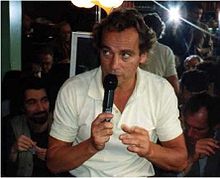Marc Sautet
Marc Sautet | |
|---|---|
 Marc Sautet 1994 at Cafe des Phares | |
| Born | 25 February 1947[1] Normandy, France |
| Died | 3 March 1998 (aged 51)[1] Paris, France |
| Nationality | French |
| Occupation | French philosopher |
Marc Sautet (25 February 1947 – 3 March 1998) was a French writer, teacher, translator (mainly of Nietzsche), and
Sautet branched out from his normal academic career as a
Sautet seemed to have been a quite likeable person that influenced others considerably. He wished his philosophy cafes to be for all people (parleurs de la taverne)) and to encourage freedom of expression regardless of academic background. He did not want power, money, nor religion to influence the discussions. He wished to revive the Socratic method at the meetings. He claimed, I help my clients to structure their thoughts. I am there to nourish their doubts and pose the right questions, not to supply the answers.[2][3]
Sautet considered his work, after Freud, as the practice of a sort of medicine (philotherapy). He desired to cure the European civilization of moral deterioration. He followed with passion international events, especially in Europe. Sautet wanted to bring people's everyday problems and ideas to birth.[4]
Philosophy cafe
Sautet, who has sometimes been labeled the "modern Socrates," wished to recreate the agora - the Athens marketplace where Athenian philosophers and the general public met for social gatherings and talks.[5] The rules of his Café Philosophique, also referred to as "cafés-philos", were that the speaker was to talk to everyone at all times, not to any individual. The speaker was not to be an expert on any subject and one person (probably the moderator) was to pick the topic of discussion.[5]
Spin-off cafes
Café Scientifique, started in 1998, is based on the Sautet's concept.
See also
Notes
- ^ a b c d Obituary - "The Times" newspaper of London (UK): 1 April 1998. pg. 21
- ^ Cafe philo
- ^ Steeped in Thought: The Philosophy café Movement Archived 2011-10-04 at the Wayback Machine
- ^ Raabe, p. 37
- ^ a b David Rohde, New Paris Import: Pondering the Big Questions at Cafes, New York Times; Nov 17, 1996; pg. CY11
References
- Chaplin, Tamara, Turning on the mind: French philosophers on television, University of Chicago Press, 2007, ISBN 0-226-50991-5
- Courouve, Claude, Un Café pour Sautet - La méthode, le café, la thèse, Paris : chez l’auteur, 1995, ISBN 2-86254-021-8).
- Courouve, Claude, « Démocratie et anarchie dans les cafés de philosophie », Esprit (magazine), Paris, n° 239, janvier 1998, pages 200–205.
- Marinoff, Lou, Philosophical practice, Academic Press, 2002, ISBN 0-12-471555-9
- Raabe, Peter B., Issues in philosophical counseling, Greenwood Publishing Group, 2002, ISBN 0-275-97667-X
- Sautet, Marc, Un café pour Socrate : comment la philosophie peut nous aider à comprendre le monde d'aujourd'hui, Paris : R. Laffont, 1995, ISBN 2-221-07606-0
Bibliography
- Par-delà le bien et le mal, 2000.
- A quoi sert la philosophie, 1998.
- Les Femmes ? De leur émancipation, 1998.
- Les Philosophes à la question, 1996
- Un café pour Socrate, Paris : Éditions Robert Laffont, 1995.
- Nietzsche pour débutants, 1986.
- Nietzsche et la Commune, 1981.
